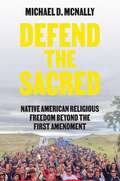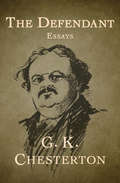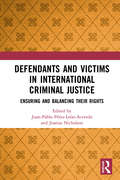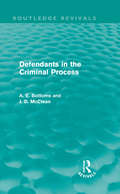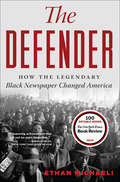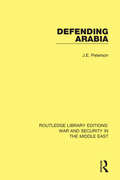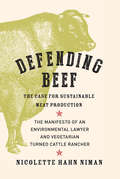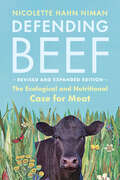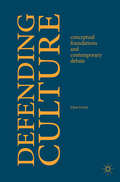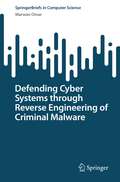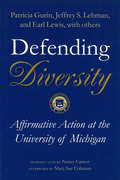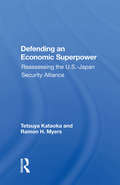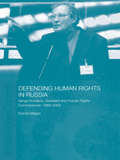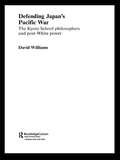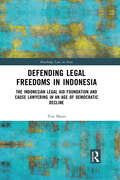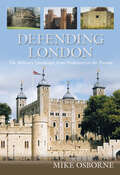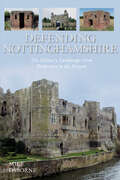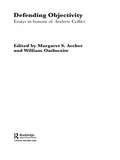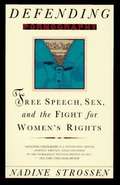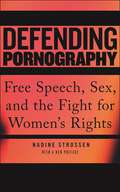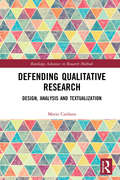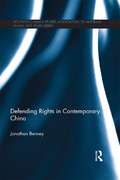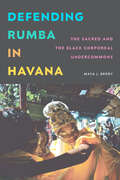- Table View
- List View
Defend the Sacred: Native American Religious Freedom beyond the First Amendment
by Michael D. McNallyThe remarkable story of the innovative legal strategies Native Americans have used to protect their religious rightsFrom North Dakota's Standing Rock encampments to Arizona's San Francisco Peaks, Native Americans have repeatedly asserted legal rights to religious freedom to protect their sacred places, practices, objects, knowledge, and ancestral remains. But these claims have met with little success in court because Native American communal traditions don't fit easily into modern Western definitions of religion. In Defend the Sacred, Michael McNally explores how, in response to this situation, Native peoples have creatively turned to other legal means to safeguard what matters to them.To articulate their claims, Native peoples have resourcefully used the languages of cultural resources under environmental and historic preservation law; of sovereignty under treaty-based federal Indian law; and, increasingly, of Indigenous rights under international human rights law. Along the way, Native nations still draw on the rhetorical power of religious freedom to gain legislative and regulatory successes beyond the First Amendment.The story of Native American advocates and their struggle to protect their liberties, Defend the Sacred casts new light on discussions of religious freedom, cultural resource management, and the vitality of Indigenous religions today.
The Defendant: Essays
by G. K. ChestertonG. K. Chesterton's hilarious defense . . . of just about anything In this hodgepodge of early musings, a young G. K. Chesterton operates under the conceit that many objects in the human purview--ranging from the humdrum and mundane to the outright ridiculous--could use the advocacy of a good apologist every once in a while. This lively book, filled with essays from Chesterton's days as a budding journalist for the Speaker, vindicates everything from skeletons to detective stories, from patriotism to penny dreadfuls. An ardent defender of the indefensible, Chesterton earns his reputation as the "prince of paradox" in The Defendant and reminds us why he is often regarded as one of the greatest moral thinkers of his age. This ebook has been professionally proofread to ensure accuracy and readability on all devices.
Defendants and Victims in International Criminal Justice: Ensuring and Balancing Their Rights
by Juan-Pablo Pérez-León-Acevedo Joanna NicholsonThis volume considers a variety of key issues pertaining to the rights of defendants and victims at International Criminal Courts (ICTs) and explores how best to balance and enhance the rights of both in order to ensure the effectiveness and efficiency of international criminal proceedings. The rights of victims are becoming an increasingly important issue at ICTs. Yet, at the same time, this has to be achieved without having a detrimental impact upon on the rights of the defence and the efficiency of the courts. This book provides analyses of issues on the rights of both the accused and the victims. By discussing matters concerning these two pivotal actors in international criminal justice within the same volume, the work highlights that there are intrinsic and intense conflicting and converging relationships between victims and the accused, particularly in terms of their rights. While most of the chapters focus mainly on either the accused or the victims, others discuss both at the same time. The work strikes a fine balance between, on the one hand, classic topics on the rights of the accused and the rights of the victims and, on the other, topics which have been largely unexplored and/or which require new angles or perspectives. Additionally, there are some chapters which approach both the rights of the accused and the rights of the victims in new contexts and/or under novel perspectives. The book as a whole provides a discussion of the two sides of this important coin of international criminal justice. The work will be an essential resource for academics, practitioners and students with an interest in the field of international criminal law. It will also be of interest to human rights scholars who are working with the rights of victims and the accused.
Defendants in the Criminal Process (Routledge Revivals)
by A. E. Bottoms J. D. McCleanFirst published in 1976, this book examines the practical workings of the English criminal court system, focusing on the defendant’s experiences of the system and the decisions he takes as he passes through it. Indeed, the defendant in a criminal case is in a unique position to experience the whole criminal process, from the first approaches of the investigating policeman to conviction, sentence and possible appeal. Defendants in the Criminal Process is based upon the close observation of criminal cases and on interviews with defendants. The authors raise several issues and questions to be addressed by those involved in the administration of justice, whether as court administrators, judges, magistrates or lawyers. They also discuss issues of special importance for academics and others concerned with the explanation of the court process.
The Defender: How the Legendary Black Newspaper Changed America
by Ethan MichaeliThis &“extraordinary history&” of the influential black newspaper is &“deeply researched, elegantly written [and] a towering achievement&” (Brent Staples, New York Times Book Review). In 1905, Robert S. Abbott started printing The Chicago Defender, a newspaper dedicated to condemning Jim Crow and encouraging African Americans living in the South to join the Great Migration. Smuggling hundreds of thousands of copies into the most isolated communities in the segregated South, Abbott gave voice to the voiceless, galvanized the electoral power of black America, and became one of the first black millionaires in the process. His successor wielded the newspaper&’s clout to elect mayors and presidents, including Harry S. Truman and John F. Kennedy, who would have lost in 1960 if not for The Defender&’s support. Drawing on dozens of interviews and extensive archival research, Ethan Michaeli constructs a revelatory narrative of journalism and race in America, bringing to life the reporters who braved lynch mobs and policemen&’s clubs to do their jobs, from the age of Teddy Roosevelt to the age of Barack Obama. &“[This] epic, meticulously detailed account not only reminds its readers that newspapers matter, but so do black lives, past and present.&” —USA Today
Defending Arabia (Routledge Library Editions: War and Security in the Middle East)
by J.E. PetersonThe defence of the Gulf has been a vital strategic concern for close on 100 years. The British first became involved in the Gulf to protect the sea routes to India and with the development of international air routes the Gulf became a crucial staging post. This book, first published in 1986, surveys the strategic issues in the defence of the Gulf from the earliest British involvement up to the Iraq-Iran war. It examines the British retreat from the Gulf and the imperial vestiges that were left behind. It considers the way in which American interests in the Gulf came to replace British interests and it analyses how American foreign policy has responded to this additional responsibility. The book also investigates the regional concerns of Gulf security and the intra-regional conflicts that have erupted in the Iraq-Iran war.
Defending Beef: The Case for Sustainable Meat Production
by Nicolette Hahn NimanFor decades it has been nearly universal dogma among environmentalists and health advocates that cattle and beef are public enemy number one. But is the matter really so clear cut? Hardly, argues environmental lawyer turned rancher Nicolette Hahn Niman in her new book, Defending Beef. The public has long been led to believe that livestock, especially cattle, erode soils, pollute air and water, damage riparian areas, and decimate wildlife populations. In Defending Beef, Hahn Niman argues that cattle are not inherently bad for either the Earth or our own nutritional health. In fact, properly managed livestock play an essential role in maintaining grassland ecosystems by functioning as surrogates for herds of wild ruminants that once covered the globe. Hahn Niman argues that dispersed, grass-fed, small-scale farms can and should become the basis for American food production, replacing the factory farms that harm animals and the environment. The author--a longtime vegetarian--goes on to dispel popular myths about how eating beef is bad for our bodies. She methodically evaluates health claims made against beef, demonstrating that such claims have proven false. She shows how foods from cattle--milk and meat, particularly when raised entirely on grass--are healthful, extremely nutritious, and an irreplaceable part of the world's food system. Grounded in empirical scientific data and with living examples from around the world, Defending Beef builds a comprehensive argument that cattle can help to build carbon-sequestering soils to mitigate climate change, enhance biodiversity, help prevent desertification, and provide invaluable nutrition. Defending Beef is simultaneously a book about big ideas and the author's own personal tale--she starts out as a skeptical vegetarian and eventually becomes an enthusiastic participant in environmentally sustainable ranching. While no single book can definitively answer the thorny question of how to feed the Earth's growing population, Defending Beef makes the case that, whatever the world's future food system looks like, cattle and beef can and must be part of the solution.
Defending Beef: The Ecological and Nutritional Case for Meat, 2nd Edition
by null Nicolette Hahn Niman&“Nicolette Hahn Niman sets out to debunk just about everything you think you know . . . She&’s not trying to change your mind; she&’s trying to save your world.&”—Los Angeles Times &“Elegant, strongly argued.&”—The Atlantic (named a &“Best Food Book&”)As the meat industry—from small-scale ranchers and butchers to sprawling slaughterhouse operators—responds to COVID-19, the climate threat, and the rise of plant-based meats, Defending Beef delivers a passionate argument for responsible meat production and consumption–in an updated and expanded new edition.For decades it has been nearly universal dogma among environmentalists that many forms of livestock—goats, sheep, and others, but especially cattle—are Public Enemy Number One. They erode soils, pollute air and water, damage riparian areas, and decimate wildlife populations. As recently as 2019, a widely circulated Green New Deal fact sheet even highlighted the problem of &“farting cows.&” But is the matter really so clear-cut? Hardly. In Defending Beef, Second Edition, environmental lawyer turned rancher Nicolette Hahn Niman argues that cattle are not inherently bad for the earth. The impact of grazing can be either negative or positive, depending on how livestock are managed. In fact, with proper oversight, livestock can play an essential role in maintaining grassland ecosystems by performing the same functions as the natural herbivores that once roamed and grazed there.With more public discussions and media being paid to connections between health and diet, food and climate, and climate and farming—especially cattle farming, Defending Beef has never been more timely. And in this newly revised and updated edition, the author also addresses the explosion in popularity of &“fake meat&” (both highly processed &“plant-based foods&” and meat grown from cells in a lab, rather than on the hoof).Defending Beef is simultaneously a book about big issues and the personal journey of the author, who continues to fight for animal welfare and good science. Hahn Niman shows how dispersed, grass-based, smaller-scale farms can and should become the basis of American food production.&“Creating healthful, delicious food in ecological balance is among humanity&’s greatest challenges. In this insightful book, Nicolette Hahn Niman shows why cattle on grass are an essential element. Every chef in America should read this book.&”—Alice Waters, founder/owner, Chez Panisse, and author of We Are What We Eat&“Nicolette Hahn Niman just became beef&’s most articulate advocate. In Defending Beef, she pivots gracefully between the personal and the scientific, the impassioned and the evenhanded. It&’s a deeply compelling and delicious vision for the future of food.&”—Dan Barber, author of The Third Plate
Defending Culture
by Johan FornäsThis book concerns the implications and interrelations of key concepts of culture, defending an updated communicative notion of culture as meaning-making against a series of current challenges. The first part of the book distinguishes four main concepts of culture, presenting their histories, uses, limitations and mutual contradictions, which else often tend to be neglected. The second part scrutinizes neomaterialist and posthumanist critics’ antihermeneutic efforts to escape the spirals of interpretation and meaning. Learning from such contestations, the third part summarizes the arguments and in five theses reconstructs a contemporary and comprehensive agenda for cultural studies, based on creative imagination and communicative mediation in the dynamic interface between meaning and materiality. This thus provides a survey of fundamental concepts and theories of culture for students and scholars in the humanities and social sciences, while simultaneously also serving as an introductory guide to the contemporary debate in this field.
Defending Cyber Systems through Reverse Engineering of Criminal Malware (SpringerBriefs in Computer Science)
by Marwan OmarThis SpringerBrief discusses underlying principles of malware reverse engineering and introduces the major techniques and tools needed to effectively analyze malware that targets business organizations. It also covers the examination of real-world malware samples, which illustrates the knowledge and skills necessary to take control of cyberattacks.This SpringerBrief explores key tools and techniques to learn the main elements of malware analysis from the inside out. It also presents malware reverse engineering using several methodical phases, in order to gain a window into the mind set of hackers. Furthermore, this brief examines malicious program’s behavior and views its code-level patterns. Real world malware specimens are used to demonstrate the emerging behavioral patterns of battlefield malware as well.This SpringerBrief is unique, because it demonstrates the capabilities of emerging malware by conducting reverse-code engineering on real malware samples and conducting behavioral analysis in isolated lab system. Specifically, the author focuses on analyzing malicious Windows executables. This type of malware poses a large threat to modern enterprises. Attackers often deploy malicious documents and browser-based exploits to attack Windows enterprise environment. Readers learn how to take malware inside-out using static properties analysis, behavioral analysis and code-level analysis techniques.The primary audience for this SpringerBrief is undergraduate students studying cybersecurity and researchers working in this field. Cyber security professionals that desire to learn more about malware analysis tools and techniques will also want to purchase this SpringerBrief.
Defending Diversity
by Patricia Gurin Jeffrey S. Lehman Earl LewisEven as lawsuits challenging its admissions policies made their way through the courts, the University of Michigan carried the torch for affirmative action in higher education. In June 2003, the Supreme Court vindicated UM's position on affirmative action when it ruled that race may be used as a factor for universities in their admissions programs, thus confirming what the UM had argued all along: diversity in the classroom translates to a beneficial and wide-ranging social value. With the green light given to the law school's admissions policies, Defending Diversity validates the positive benefits gained by students in a diverse educational setting. Written by prominent University of Michigan faculty, Defending Diversity is a timely response to the court's ruling. Providing factual background, historical setting, and the psychosocial implications of affirmative action, the book illuminates the many benefits of a diverse higher educational setting -- including preparing students to be full participants in a pluralistic democracy -- and demonstrates why affirmative action is necessary to achieve that diversity. Defending Diversity is a significant contribution to the ongoing discussion on affirmative action in higher education. Perhaps more important, it is a valuable record of the history, events, arguments, and issues surrounding the original lawsuits and the Supreme Court's subsequent ruling, and helps reclaim the debate from those forces opposed to affirmative action.
Defending An Economic Superpower: Reassessing The U.s.-japan Security Alliance
by Tetsuya KataokaThis book describes the reassessment of the U.S.-Japan security relationship to determine how Japan can do more for its defense, reduce America's spending for Japan's and Asia's security, yet preserve the peace in that region. It raises six questions about the relationship and tries to answer them.
Defending French in Flanders, 1873–1974: Between Liberty and Identity
by David J. HensleyThis book examines the efforts of the French-speaking minority in Flanders, Belgium, to maintain a legal and social presence of the French language in Flemish public life. Chronologically, the study is bookended by two developments, almost exactly a century apart. In 1873, the first laws were passed which required the use of Dutch in some aspects of public administration in Flanders, challenging the de facto use of French among the Flemish ruling class. One hundred and one years later, the last French daily newspaper in Flanders collapsed, marking the end of a once-vibrant French-language public sphere in Flanders. The author contends that the methods and arguments by which French speakers defended the role of French in Flemish public life changed along with the social and political situation of this minority. As the Flemish movement grew over the course of the twentieth century, French speakers’ appeals to the “free choice” of language lost traction, and they put forward claims that they represented an ethnolinguistic minority who deserved protection for their mother tongue. Providing new insights for scholars of European history, and in conversation with the literature on liberalism, national identity, and Francophonie, this book demonstrates how the debate over the role of French in Flanders was at the center of Belgium’s ethnolinguistic conflict – the repercussions of which continue to be felt to this day.
Defending Human Rights in Russia: Sergei Kovalyov, Dissident and Human Rights Commissioner, 1969-2003 (BASEES/Routledge Series on Russian and East European Studies)
by Emma GilliganSergei Kovalyov is a central figure in the struggle for human rights in Russia. He was a leading Soviet biology academic and, in the 1970s after becoming active in dissident circles, was arrested by the KGB, tried, imprisoned and subjected to internal exile. After his release, he continued to work for human rights, eventually becoming chairman of the Soviet Human Rights Committee and chairman of the Presidential Human Rights Commission, in which positions he was extremely influential in framing human rights provisions in post-Communist Russia. He subsequently took President Yeltsin to task for human rights failings, eventually resigning in protest. This book, by tracing Kovalyov's political career, shows how human rights developed in Russia in late Soviet and post Soviet times.
Defending Japan's Pacific War: The Kyoto School Philosophers and Post-White Power
by David WilliamsThis book puts forward a revisionist view of Japanese wartime thinking. It seeks to explore why Japanese intellectuals, historians and philosophers of the time insisted that Japan had to turn its back on the West and attack the United States and the British Empire. Based on a close reading of the texts written by members of the highly influential Kyoto School, and revisiting the dialogue between the Kyoto School and the German philosopher Heidegger, it argues that the work of Kyoto thinkers cannot be dismissed as mere fascist propaganda, and that this work, in which race is a key theme, constitutes a reasoned case for a post-White world. The author also argues that this theme is increasingly relevant at present, as demographic changes are set to transform the political and social landscape of North America and Western Europe over the next fifty years.
Defending Legal Freedoms in Indonesia: The Indonesian Legal Aid Foundation and Cause Lawyering in an Age of Democratic Decline (Routledge Law in Asia)
by Tim MannDefending Legal Freedoms in Indonesia provides fresh insights into how cause lawyers navigate political and institutional change, by presenting and analysing the Indonesian Legal Aid Foundation (YLBHI), the oldest and most influential legal and human rights organisation in Indonesia.Based on rich ethnographic research, this book charts the developments of the organisation since its founding in 1970, its contribution to the ending of the authoritarian, military-backed New Order (1966-1998), its relative decline in the years following Indonesia’s democratisation and its revival in recent years as Indonesian democracy and human rights come under threat. The author examines the tactics the organisation has used, including show trials and working alongside grassroots communities, organising them and educating them about their rights. It highlights how this organisation flourished more under an authoritarian regime than under democracy and how its present, prominent, adversarial-political version of cause lawyering is playing a leading role in civil society resisting further erosion of democracy and human rights. The book addresses recent democratic erosion under President Joko Widodo, and documents pivotal moments in Indonesia’s contemporary history, such as the ‘Reform Corrupted’ mass demonstrations in 2019, illuminating how democracy shrinks, and how lawyers push back.The first book on Indonesia’s crucially important cause lawyering, activist lawyers’ group, this book will be of interest to researchers in Asian Law, Indonesian Studies. It is also an essential point of reference for future research in public lawyering in Asia.
Defending Life
by Francis J. BeckwithDefending Life, first published in 2007, is arguably the most comprehensive defense of the pro-life position on abortion - morally, legally, and politically - that has ever been published in an academic monograph. It offers a detailed and critical analysis of Roe v. Wade and Planned Parenthood v. Casey as well as arguments by those who defend a Rawlsian case for abortion-choice, such as J. J. Thomson. The author defends the substance view of persons as the view with the most explanatory power. The substance view entails that the unborn is a subject of moral rights from conception. While defending this view, the author responds to the arguments of thinkers such as Boonin, Dworkin, Stretton, Ford and Brody. He also critiques Thomson's famous violinist argument and its revisions by Boonin and McDonagh. Defending Life includes chapters critiquing arguments found in popular politics and the controversy over cloning and stem cell research.
Defending London: The Military Landscape from Prehistory to the Presenr
by Mike OsborneFor two thousand years London has been at the heart of Britain’s development as a nation, providing a focus for its political life. The military element is now usually visible only through the pageantry which attends royal occasions, but this masks a more serious underlying intent. Frequently the target for both foreign invaders and domestic factions, it has been required to defend itself against everything from seaborne raiders to aerial bombardment and the threat of nuclear war. At the same time, the direction of military affairs has been centred on London, along with the military infrastructure of barracks, depots, magazines, dockyards and munitions factories. The evidence for much of this can be seen in the landscape, from the mediaeval Tower of London and the underground nuclear citadels in the urban centre, to the royal palaces, moated sites, airfields and anti-invasion defences in the suburbs and the green belt. This book describes the various elements of London’s military heritage, and places them in their historical and social context. From the castles and strong-houses of the mediaeval and Tudor monarchs and statesmen, to the pseudo-fortresses of the Victorian militia and rifle volunteers; the airfields of the anti-Zeppelin fighters of the Royal Flying Corps, and the Battle of Britain bases of the RAF, to the pillboxes of the defences against invasion in 1940, and the anti-nuclear defences of the Cold War and beyond.
Defending Nottinghamshire: The Military Landscape from Prehistory to the Present
by Mike OsborneThis book examines the impact of military events on Nottinghamshire’s landscape from prehistoric hill forts to Cold War bunkers. Straddling the valley of the Trent, Nottinghamshire has long enjoyed a strategic importance as a frontier region in the early days of the Roman conquest, and during the struggles between the emerging Saxon kingdoms and the Danes. The Normans built castles to pacify the land, as did the kings and barons involved in the dynastic struggles which characterised long periods of medieval times. Throughout the Civil War it provided a battleground for Parliamentarian forces seeking to sever the Royalist communications centred on Newark-upon-Trent. In the twentieth century it provided training camps for Kitchener’s New Armies, munitions factories, and both training and operational airfields. This book describes the evidence, function and purpose of defensive structures and records survivals.
Defending Objectivity: Essays in Honour of Andrew Collier (Routledge Studies in Critical Realism)
by Margaret S. Archer William OuthwaiteAndrew Collier is the boldest defender of objectivity - in science, knowledge, thought, action, politics, morality and religion. In this tribute and acknowledgement of the influence his work has had on a wide readership, his colleagues show that they have been stimulated by his thinking and offer challenging responses. This wide-ranging book covers key areas with which defenders of objectivity often have to engage. Sections are devoted to the following: * objectivity of value* objectivity and everyday knowledge* objectivity in political economy* objectivity and reflexivity* objectivity postmodernism and feminism* objectivity and natureThe diverse contributions range from social and political thought to philosophy, reflecting the central themes of Collier's work.
Defending Pornography: Free Speech, Sex, and the Fight for Women's Rights
by Nadine StrossenTraditional explanations of why pornography must be defended from would-be censors have concentrated on censorship's adverse impacts on free speech and sexual autonomy. In contrast, Nadine Strossen focuses on the women's rights-centered rationale for defending pornography.
Defending Pornography: Free Speech, Sex, and the Fight for Women's Rights
by Nadine StrossenA new edition of a groundbreaking, feminist defense of pornography as free speechNamed a Notable Book by The New York Times Book Review in 1995, Defending Pornography examines a key question that has divided feminists for decades: is censoring pornography good or bad for women? Nadine Strossen makes a powerful case that increasing government power to censor sexual expression, beyond the limits that the First Amendment sensibly permits (for example, outlawing child pornography) would do more harm than good for women and others who have traditionally been marginalized due to sex or gender, She explains how the very anti-porn laws pushed by some feminists have led to the censorship of LGBTQ+ and feminist works, and she examines the startling connections between anti-porn feminists and right-wing fundamentalists. In an illuminating new Preface, Strossen lays out the multiple current assaults on sexual expression, which continue to come from across the ideological spectrum. She shows that freedom for such expression remains an essential prerequisite for the equality, safety, and dignity of women and sexual/gender minorities.
Defending Qualitative Research: Design, Analysis, and Textualization (Routledge Advances in Research Methods)
by Mario CardanoFocussing on the phases of qualitative research which precede and follow fieldwork – design, analysis, and textualization – this book offers new theoretical tools to tackle one of the most common criticisms advanced against qualitative research: its presumed lack of rigour. Rejecting the notion of “rigour” as formulated in quantitative research and based on the theory of probability, it proposes a theoretical frame that allows combining the goals of rigour and that of creativity through the reference to theory of argumentation. As such, it will appeal to scholars and students across the social sciences with interests in qualitative research methods.
Defending Rights in Contemporary China: Reserving The Right (Routledge/Asian Studies Association of Australia (ASAA) East Asian Series)
by Jonathan BenneyThe growth of rights defence movements in China reflects the increasing capacity of Chinese citizens to shape their own civic discourse in order to achieve diverse goals. Rights defence campaigns have taken novel forms which are unprecedented in China, including the use of the Internet by rights campaigners, the development of rights entrepreneurs, and the selection of representatives and leaders in rights defence campaigns. Defending Rights in Contemporary China offers the first comprehensive analysis of the emergence and development of notions of rights defence, or weiquan, in China. Further, it shows that rights defence campaigns reflect the changing lives and priorities of Chinese citizens, both urban and rural, and the changing distribution of power in China. The Chinese government first used rights defence to promote the law and protect the rights of the weak. But the use of rights defence strategies by private citizens, and lawyers also demonstrates changing power structures – in areas as diverse as private property rights, rights for the handicapped, corruption claims and grievances with officials. In this book, Jonathan Benney argues that the idea of rights defence has gone from being a tool of the government to being a tool to attack the party-state, and explores the consequences of this controversial activist movement. This book offers essential insight into the development of rights in contemporary China and will be highly relevant for students, scholars and specialists in legal developments in Asia as well as anyone interested in social movements in China.
Defending Rumba in Havana: The Sacred and the Black Corporeal Undercommons
by Maya J. BerryIn Defending Rumba in Havana, anthropologist and dancer Maya J. Berry examines rumba as a way of knowing the embodied and spiritual dimensions of Black political imagination in post-Fidel Cuba. Historically a Black working-class popular dance, rumba, Berry contends, is a method of Black Cuban struggle that provides the community, accountability, sustenance, and dignity that neither the state nor the expanding private market can. Berry’s feminist theorization builds on the notion of the undercommons to show how rumba creates a space in which its practitioners enact deeply felt and dedicatedly defended choreographies of reciprocity, refusal, sovereignty, devotion, and pleasure, both on stage and in their daily lives. Berry demonstrates that this Black corporeal undercommons emphasizes mutual aid and refuses neoliberal development logics, favoring instead a collective self-determination rooted in African diasporic spiritual practices through which material compensation and gendered power dynamics are negotiated. By centering rumba to analyze how poor Black Cubans navigate gendered and racialized life, Berry helps readers better understand the constraints and yearnings that move diasporic Black struggles to seek refuge beyond the bounds of the nation-state.Duke University Press Scholars of Color First Book Award
